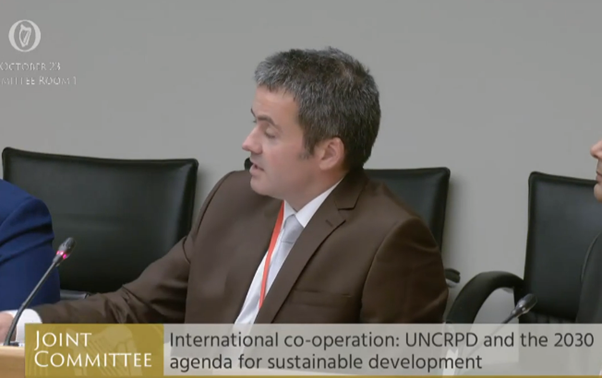Imagine losing your sight as war engulfs your country
Christian Blind Mission Ireland was set up 20 years ago in Ireland to support people with disabilities across the developing world. There has been progress for sure. But certainly not enough. Each Budget in Ireland sees incremental improvements in what is offered to carers who look after family members with disability. There has been a huge shift from institutional care to home and community-based care.
In many ways, people with disabilities are treated differently than they were previously – and treated better too. That is not to say that they were not cared for before that: the governmental support was not there as many families struggled by themselves, figuring things out by themselves, with little to no welfare support, often only finding a welcoming place through charitable organisations and in institutions when the task was just too much.
This is why CBM Ireland is working to support people with disabilities across the developing world. We work in countries that are riven with conflict. We see economic development taking a step back in many of the places we work in. Consider being a person with a disability in war-torn Burkina Faso or in the midst of the Boko Haram insurgency in Nigeria.
Already, you live in a country with limited to no social safety nets. Your family lives day-to-day. Making ends meet and putting food on the table is the aim. There is no governmental support; no welfare system; schools are not equipped to enable you to access education if you are blind or deaf; the roads are not paved and there are no footpaths for your wheelchair to traverse to school – which is many kilometres away. You don’t have accessible mini-vans.
You might have preventable and treatable cataracts – but you have to choose between buying food or paying for a long bus journey to the capital, before you even consider the cost of the surgery. Here in Ireland, we see a cataracts bus travelling North to help people get this necessary and life-changing surgery. Imagine how much more difficult it is in Zimbabwe?
I have worked with aid agencies and international charities for over twenty years. I know from my own experience – and my own lack of knowledge, lack of awareness, lack of understanding – whether after the earthquake in Nepal, the super-typhoon in the Philippines, or in the Ebola outbreak in West Africa, consideration of what people with disabilities need in a crisis is not often to the forefront of anyone’s thoughts.
In Sierra Leone, when Ebola hit a village, it was locked down and aid agencies provided all the basic needs for weeks until the virus had run its course to stop people moving and spreading the virus. In the urgency to support as many families and communities in that time as quickly as possible, I don’t think we ever considered what people with disabilities might need. We didn’t think about what a deaf person might need, a blind person, an amputee.
Christian Blind Mission works to bridge that gap. Sometimes our work is the simple provision of medical assistance, right here, right now, when there is no other option. At the same time, we try to convince governments to invest in care for people with disabilities – but this is a very long-term solution. Change doesn’t come about easy. And sometimes we work with families and communities, with local organisation set up and run by people with disabilities, so that they can be the ones to make the difference.
This article originally appeared in the ALIVE newspaper
